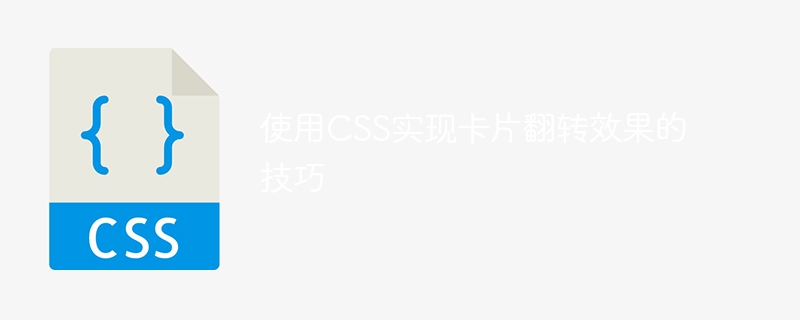

Tips of using CSS to achieve card flip effect
CSS is one of the most commonly used technologies in front-end development. It can not only beautify the page, but also achieve something cool. special effects. Among them, the card flip effect is a very common and attractive effect. This article will introduce how to use CSS to achieve the card flip effect and provide specific code examples.
First, we need to prepare an HTML structure containing two divs, one div represents the front of the card, and the other div represents the back of the card. An example is as follows:
<div class="card-container">
<div class="card">
<div class="card-front">
<!-- 正面内容 -->
</div>
<div class="card-back">
<!-- 背面内容 -->
</div>
</div>
</div>Next, we need to set CSS styles for the front and back of the card, as well as some basic styles for the entire card container. An example is as follows:
.card-container {
perspective: 1000px; /* 设置透视视角 */
}
.card {
position: relative;
width: 200px;
height: 300px;
transform-style: preserve-3d; /* 设置元素在3D空间中保持原有形状 */
transition: transform 0.5s; /* 设置过渡效果的时间 */
}
.card-front, .card-back {
position: absolute;
width: 100%;
height: 100%;
backface-visibility: hidden; /* 隐藏背面元素 */
}
.card-front {
transform: rotateY(0deg); /* 设置初始正面朝向 */
}
.card-back {
transform: rotateY(180deg); /* 设置初始背面朝向 */
}Finally, we need to set events for the card that trigger the flip animation, such as mouse hover or click events. We can use the :hover pseudo-class to trigger the flip effect on mouse hover, and use JavaScript to trigger the flip effect on click events. An example is as follows:
.card:hover {
transform: rotateY(180deg); /* 鼠标悬停时翻转到背面 */
}
.card.active {
transform: rotateY(180deg); /* 点击时翻转到背面 */
}var card = document.querySelector('.card');
card.addEventListener('click', function() {
card.classList.toggle('active'); /* 切换active类名来触发翻转效果 */
});With the above code, we can achieve a simple card flip effect. When the mouse is hovering over a card, the card will flip to the back immediately; when the card is clicked, the card will slowly flip to the back. The specific effects will be adjusted according to actual needs.
Summary:
Using CSS to achieve the card flip effect is not complicated. You only need to prepare a card structure including the front and back, set some CSS styles and events that trigger the flip effect. The above are the techniques for using CSS to achieve the card flip effect, and specific code examples are provided. I hope it will be helpful to you!
The above is the detailed content of Tips for using CSS to achieve card flip effect. For more information, please follow other related articles on the PHP Chinese website!
 How to solve 0xc000409 error
How to solve 0xc000409 error
 How to set header and footer in Word
How to set header and footer in Word
 html formatting method
html formatting method
 What to do if the CPU usage is too high
What to do if the CPU usage is too high
 What software is premiere
What software is premiere
 How to intercept strings in shell
How to intercept strings in shell
 How to solve timed out
How to solve timed out
 Introduction to welding method types
Introduction to welding method types
 How to cancel automatic renewal of Taobao Money Saving Card
How to cancel automatic renewal of Taobao Money Saving Card




